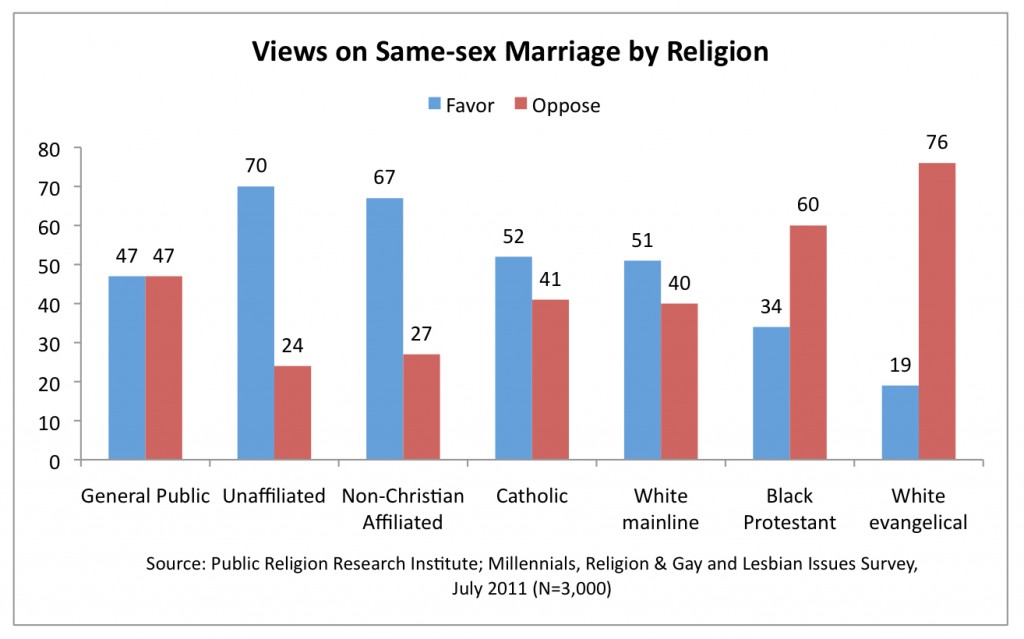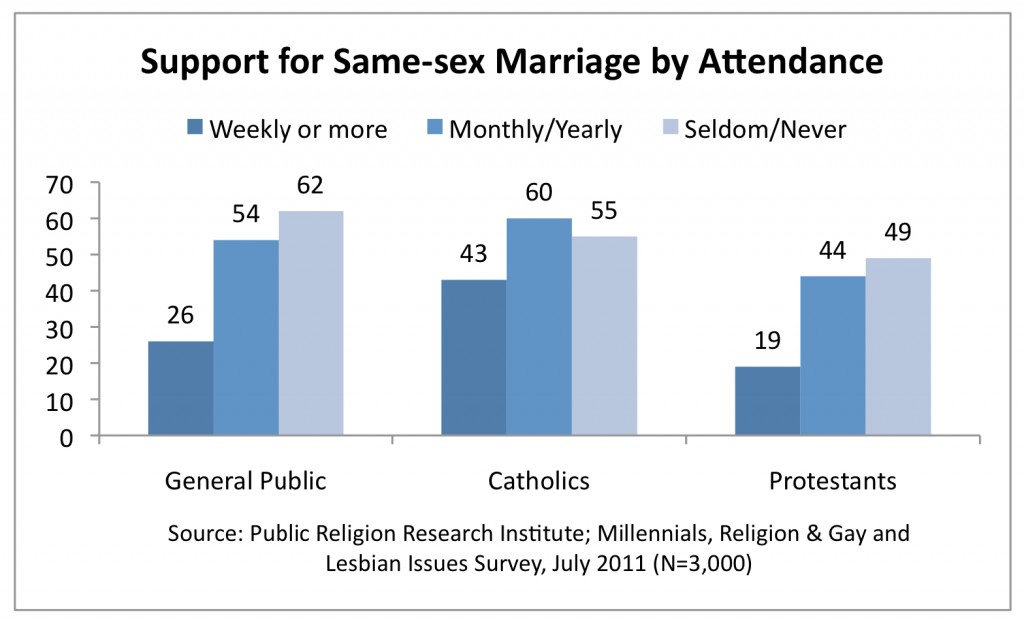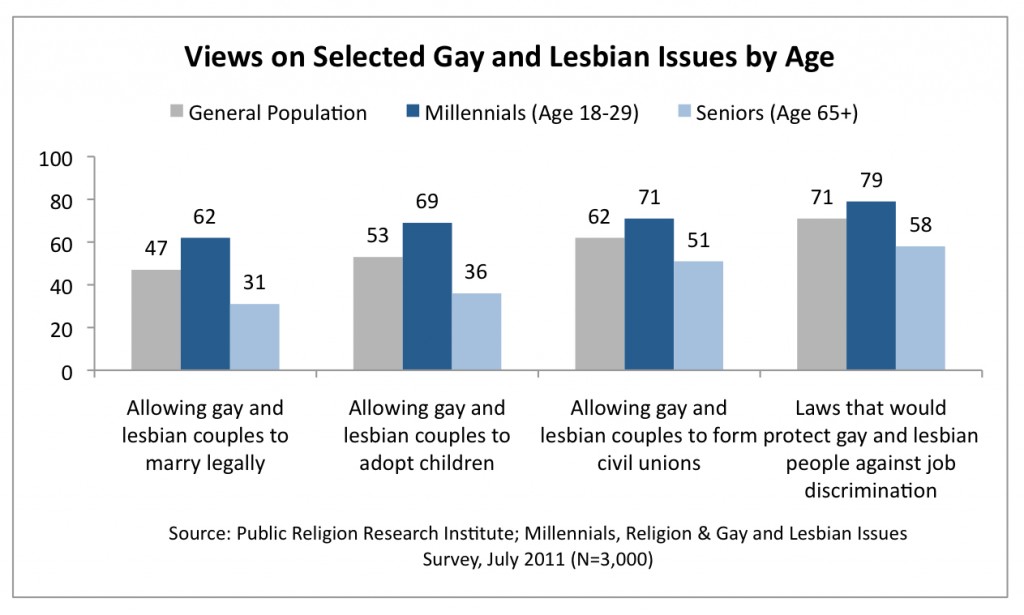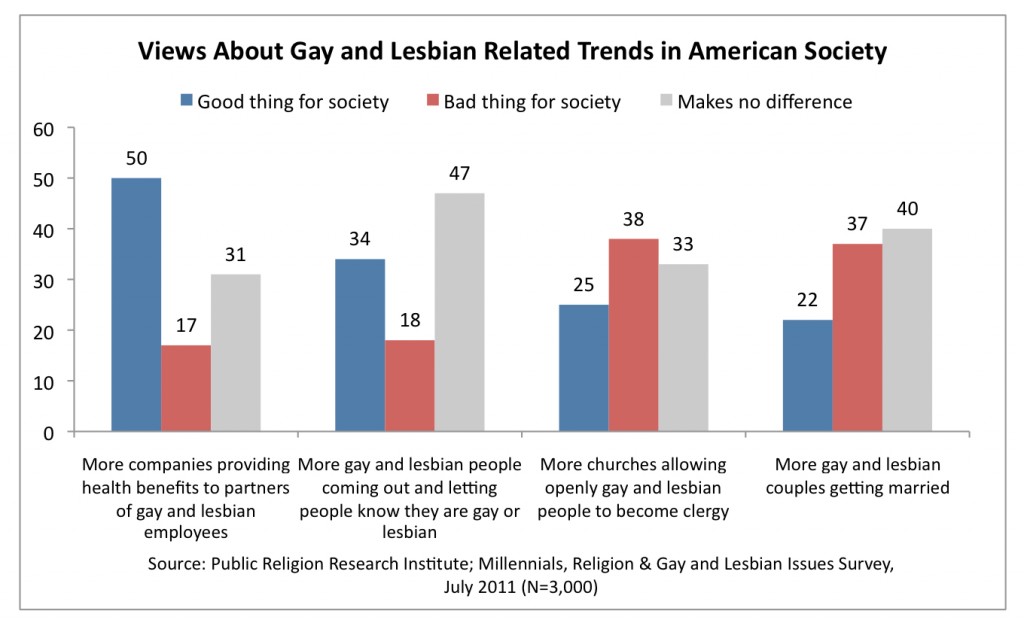Executive Summary
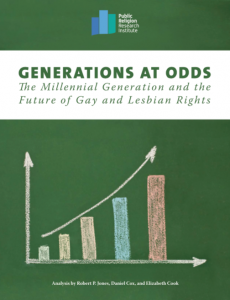 There is at least a 20-point generation gap between Millennials (age 18 to 29) and seniors (age 65 and older) on every public policy measure in the survey concerning rights for gay and lesbian people.
There is at least a 20-point generation gap between Millennials (age 18 to 29) and seniors (age 65 and older) on every public policy measure in the survey concerning rights for gay and lesbian people.
More than 6-in-10 (62%) Millennials favor allowing gay and lesbian couples to marry, 69% favor allowing gay and lesbian couples to adopt children, 71% favor civil unions, and 79% favor employment discrimination protections for gay and lesbian people.
Among seniors, only about 1-in-3 favor allowing gay and lesbian couples to marry (31%) or favor allowing gay and lesbian couples to adopt children (36%). A majority of seniors favor civil unions (51%) and employment discrimination protections for gay and lesbian people (58%), but support lags significantly behind Millennials and the general population.
The generation gap in support for same-sex marriage is striking and persists even among conservative political and religious groups.
Nearly half (49%) of Republican Millennials favor allowing gay and lesbian people to marry, compared to only 19% of Republican seniors and less than one-third (31%) of all Republicans. Forty-four percent of white evangelical Millennials favor allowing gay and lesbian people to marry, compared to only 12% of evangelical seniors and 19% of evangelicals overall.
Public support for allowing gay and lesbian couples to marry has increased significantly over the last 5 years.
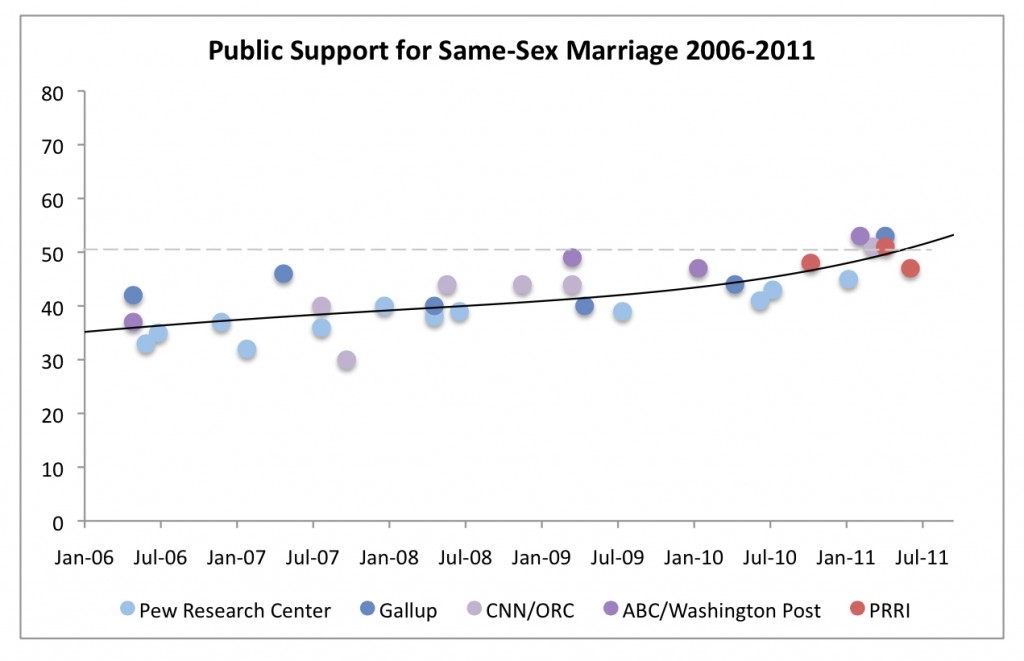
Many polling organizations have recorded double-digit increases in support for same-sex marriage since 2006. In 2011, for the first time, multiple surveys from different organizations (including Gallup, ABC/Washington Post, CNN and Public Religion Research Institute) found a majority of the public favored same-sex marriage. In PRRI’s current July survey, views about same-sex marriage are evenly divided; 47% of Americans favor it and 47% oppose it.
There is also a strong net positive self-reported increase in support for same-sex marriage among the general population, and most Americans currently say supporting same-sex marriage is the more socially acceptable position to hold.
- Among Americans who say their views have shifted over the last five years, more than twice as many say their current opinion about the legality of same-sex marriage has become more supportive than more opposed (19% and 9% respectively).
- Consistent with this sea change in opinion over the last five years, a majority (51%) of Americans currently say it is more socially acceptable to support same-sex marriage rather than to oppose it. Nearly two-thirds (64%) of Millennials say it is more socially acceptable to favor same-sex marriage, while a majority (56%) of seniors say it is more socially acceptable to oppose same-sex marriage.
Despite the conventional wisdom that religious groups generally oppose rights for gay and lesbian Americans, there are major religious groups on both sides of the debate over same-sex marriage.
- Majorities of non-Christian religiously affiliated Americans (67%), Catholics (52%), and white mainline Protestants (51%) favor allowing gay and lesbian couples to marry.
- On the other hand, 6-in-10 (60%) African American Protestants and approximately three-quarters (76%) of white evangelical Protestants oppose allowing gay and lesbian couples to marry.
There is broad acceptance of same-sex relationships in society and Americans are comfortable with gay and lesbian people in a variety of public professions.
- Nearly two-thirds (64%) of Americans agree that gay and lesbian relationships should be accepted by society, including majorities of all major religious groups except white evangelicals.
- Americans are comfortable with gay and lesbian people serving in a variety of public roles in society, including as a law enforcement officer (75%), a doctor (71%), a judge (70%), a high school teacher (63%), an elementary school teacher (61%), and a clergy person (56%).
Most Americans believe it is difficult to live openly as a gay or lesbian person, but twice as many Americans believe more gay and lesbian people “coming out” is a good thing rather than a bad thing for American society.
A majority (51%) of the public say it is very or somewhat difficult in their community to live as an openly gay or lesbian person, compared to 45% who say it is not too or not at all difficult. More than one-third (34%) of Americans say that more gay and lesbian people “coming out” and letting people know they are gay or lesbian is a good thing for society, compared to 18% who say it is a bad thing for society.
Slightly more Catholics believe the Catholic Church’s position on the issue of homosexuality is too conservative than believe it is about right.
Forty-six percent of Catholics think the Catholic Church’s position on the issue of homosexuality is too conservative, 43% think it is about right, and only 6% think it is too liberal. Even among Catholics who attend church at least weekly, nearly 4-in-10 (37%) say that the Catholic Church is too conservative on the issue of homosexuality.
Nearly seven-in-ten (69%) Millennials agree that religious groups are alienating young people by being too judgmental about gay and lesbian issues.
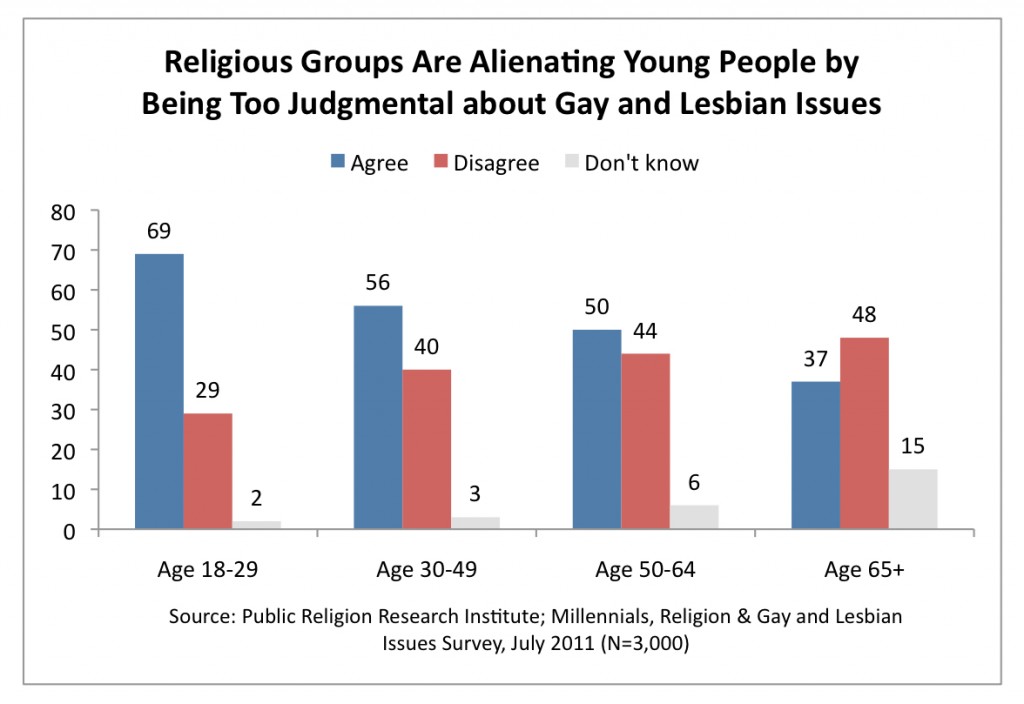
Among seniors, only 37% agree that religious groups are alienating young people by being too judgmental and 48% disagree.
More than 6-in-10 Americans believe that negative messages from America’s places of worship contribute either a lot (23%) or a little (40%) to higher rates of suicide among gay and lesbian youth.
- Among religious groups, 73% of non-Christian affiliated, 64% of Catholics, 60% of black Protestants, 59% of white mainline Protestants, and 51% of white evangelical Protestants say places of worship contribute either a lot or a little to higher rates of suicide among gay and lesbian youth.
I. Generations at Odds: Millennials vs. Seniors on Gay and Lesbian Issues
Millennials (Americans age 18 to 29) are at the vanguard of the shift that is occurring on attitudes about gay and lesbian people and homosexuality. On basic questions of policy, views about gay and lesbian people in the church and in society, and moral judgments about homosexuality, Millennials are much more liberal than the general public and dramatically more so than seniors (Americans age 65 or older). It is difficult to find another issue on which there is deeper generational disagreement than on the issue of homosexuality and rights for gay and lesbian people.
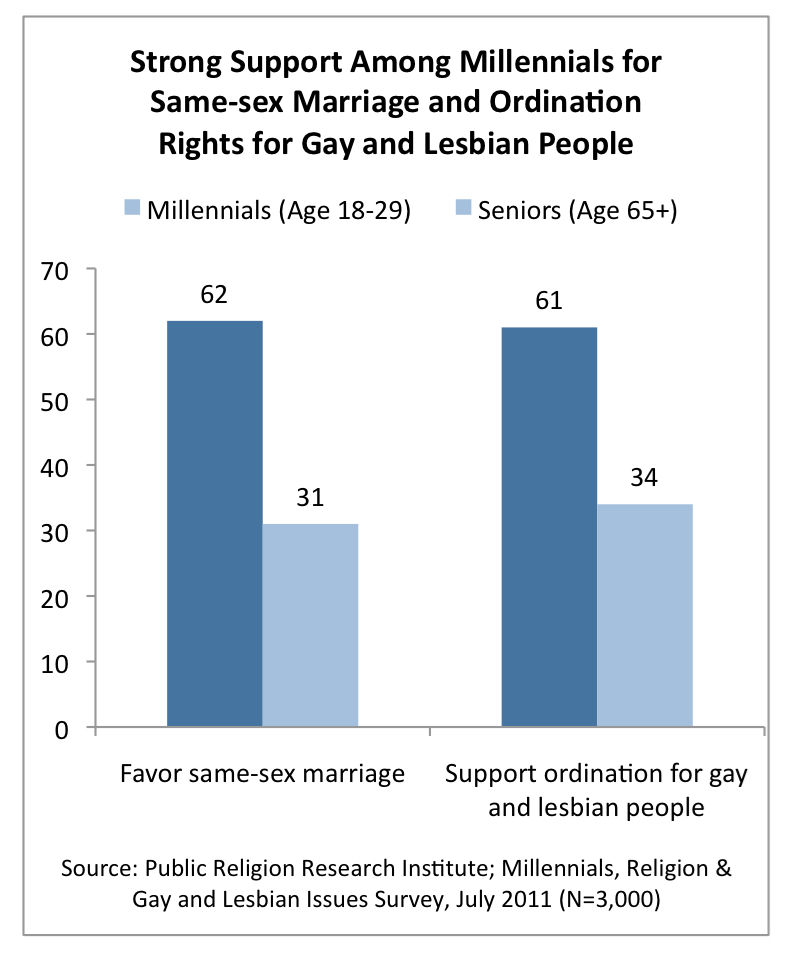 On the issue of same-sex marriage, generational differences are striking, whether the context is public policy or church policy. More than 6-in-10 (62%) Millennials favor allowing gay and lesbian couples to marry legally, double the support found among seniors (31%). The generational differences also cut across partisan and religious lines. For instance, among Republicans overall, less than one-third (31%) favor same-sex marriage; however, nearly half (49%) of Republican Millennials favor allowing gay and lesbian people to marry. Similarly, among white evangelical Protestants overall, less than 1-in-5 (19%) favor allowing gay and lesbian couples to marry, but 44% of white evangelical Millennials favor it. (1)
On the issue of same-sex marriage, generational differences are striking, whether the context is public policy or church policy. More than 6-in-10 (62%) Millennials favor allowing gay and lesbian couples to marry legally, double the support found among seniors (31%). The generational differences also cut across partisan and religious lines. For instance, among Republicans overall, less than one-third (31%) favor same-sex marriage; however, nearly half (49%) of Republican Millennials favor allowing gay and lesbian people to marry. Similarly, among white evangelical Protestants overall, less than 1-in-5 (19%) favor allowing gay and lesbian couples to marry, but 44% of white evangelical Millennials favor it. (1)
Young people are also much more supportive of gay and lesbian people being allowed to serve as religious leaders. More than 6-in-10 (61%) say gay and lesbian people should be eligible for ordination with no special requirements, compared to about one-third (34%) of seniors. There is also broader acceptance of gay and lesbian relationships in general. Nearly 8-in-10 (77%) Millennials agree that gay and lesbian relationships should be accepted by society, while seniors are evenly divided (48% agree, 48% disagree).
Millennials are also far less critical in their moral evaluations of same-sex sexual relationships than seniors. Less than half (46%) of young people say that sex between two adults of the same gender is morally wrong, compared to 69% of seniors. Half of Millennials say that sex between two adults of the same gender is morally acceptable, a view held by only 26% of seniors. Millennials are also more accepting of pre-marital sex than older generations. However, they are as likely as seniors to say abortion is morally wrong. Nearly 6-in-10 (59%) Millennials and seniors say that abortion is morally wrong.
II. Changing Attitudes on Same-Sex Marriage
Public attitudes about same-sex marriage have been steadily becoming more favorable over time. Within the last 5 years public support for same-sex marriage has increased significantly, with many polling organizations recording double-digit increases in support over this period. In 2011, for the first time, multiple surveys from different organizations (including Gallup, ABC/Washington Post, CNN and PRRI) found that a majority of the public favored same-sex marriage.
Polling from Public Religion Research Institute has confirmed the increase in support in 2011 compared to previous years, with a cluster of findings now showing about half or a small majority of Americans supporting same-sex marriage. In May 2011, PRRI found for the first time a slim majority (51%) favoring allowing gay and lesbian people to marry, compared to 43% opposing and 6% reporting they did not know. In the Millennials, Religion, and Gay/Lesbian Issues Survey in July 2011, 47% of the public report that they favor allowing gay and lesbian people to marry, 47% report they are opposed, and 6% report they do not know.
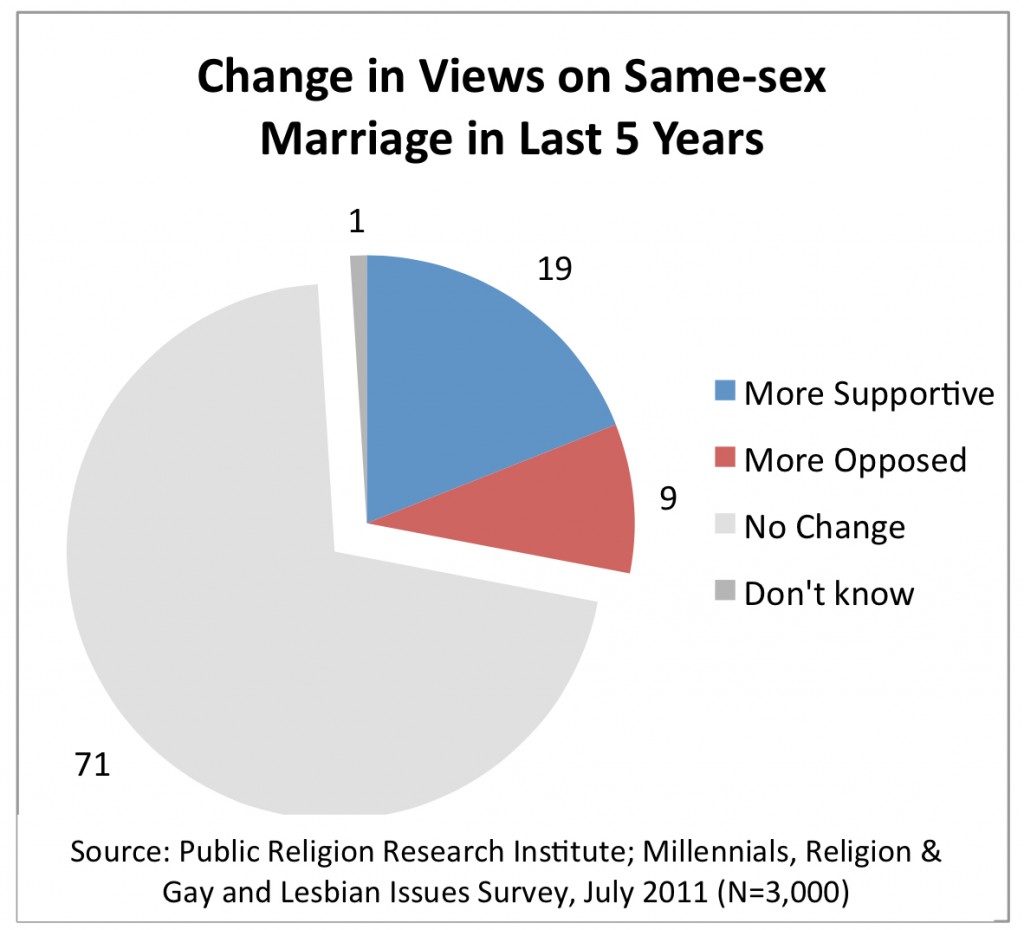 The same shift in opinion on same-sex marriage evident in recent surveys is also found in Americans’ self-reports of how their views have changed over the last 5 years. While most Americans’ views have not changed significantly over this period, among the nearly 3-in-10 whose views have shifted, twice as many Americans say their views have become more supportive than more opposed. Nearly 1-in-5 (19%) Americans say they are more supportive of the legality of same-sex marriage than they were 5 years ago, compared to only 9% who say they are now more opposed.
The same shift in opinion on same-sex marriage evident in recent surveys is also found in Americans’ self-reports of how their views have changed over the last 5 years. While most Americans’ views have not changed significantly over this period, among the nearly 3-in-10 whose views have shifted, twice as many Americans say their views have become more supportive than more opposed. Nearly 1-in-5 (19%) Americans say they are more supportive of the legality of same-sex marriage than they were 5 years ago, compared to only 9% who say they are now more opposed.
Millennials (29%), Hispanics (25%), and Catholics (23%) are significantly more likely than the general public to say they have become more supportive of same-sex marriage over the last five years. Hispanics, however, are also more likely than the general public to say they have become more opposed (17%). Seniors are the only group who are more likely to say they have become more opposed (17%) than more supportive (12%).
III. Public Policy Issues Regarding Gay and Lesbian People
The Millennial generation is more supportive of public policies protecting rights of gay and lesbian Americans than older Americans. The generational differences between Millennials and seniors are the greatest on the issue of same-sex marriage, but there is at least a 20-point generation gap on each policy measure included in the survey.
Marriage
Demographic Differences
There are major religious groups on each side of the debate over allowing gay and lesbian couples to marry legally. On the one hand, majorities of religiously unaffiliated Americans (70%), Americans affiliated with a non-Christian religion (67%), Catholics (52%), and white mainline Protestants (51%) favor allowing gay and lesbian couples to marry legally. On the other hand, large majorities of white evangelical Protestants and African American Protestants are opposed. Approximately three-quarters (76%) of white evangelical Protestants oppose allowing gay and lesbian couples to marry, including nearly half (47%) who strongly oppose it. Six-in-ten African American Protestants oppose allowing gay and lesbian couples to marry, including 42% who strongly oppose.
Frequency of religious attendance is strongly correlated with support for same-sex marriage, but the attendance patterns matter somewhat more for Protestants than for Catholics. Nearly half (47%) of Protestants report attending services weekly or more, 36% report attending monthly or a few times per year, and 16% report attending seldom or never. Protestants who attend religious services weekly or more strongly oppose allowing gay and lesbian people to marry (77% oppose, 19% favor). Compared to weekly or more attenders, more than twice as many Protestants who attend monthly or a few times a year (44%) and Protestants who seldom or never attend (49%) favor allowing gay and lesbian couples to marry. The support gap between Protestants who attend weekly or more and those who attend once or twice a month or a few times a year is a striking 25 points.
Slightly fewer (41%) Catholics than Protestants report attending religious services weekly or more, 40% report attending monthly or a few times a year, and 18% report attending seldom or never. The religious attendance affect is more muted among Catholics. Among Catholics who attend religious services weekly or more, 43% support allowing gay and lesbian couples to marry. Fully 6-in-10 (60%) Catholics who attend religious services monthly or a few times a year support same-sex marriage, as do similar numbers of Catholics who seldom or never attend (55%). The support gap between Catholics who attend weekly or more and those who attend monthly or a few times a year is 17 points.
Women are more supportive of same-sex marriage than men, with 51% of women and only 41% of men in favor of allowing gay and lesbian couples to marry. The differences are greatest between the sexes on intensity of support. Twenty-two percent of women, compared to only 13% of men, say they strongly favor allowing gay and lesbian couples to marry. Gender differences also persist within the Millennial generation. For example, about one-third (34%) of Millennial females strongly favor allowing gay and lesbian couples to marry, compared to just over 1-in-5 (22%) of their male counterparts.
Support for same-sex marriage is positively correlated with higher education levels. Among those with the least education (high school or less), only 36% support allowing gay and lesbian couples to marry. In contrast, majorities of those with a college degree (55%) and those with post-graduate education (63%) support allowing gay and lesbian couples to marry.
Democrats are much more supportive of same-sex marriage than Republicans, with those identifying as Independents closely mirroring the general public. Nearly 6-in-10 (58%) Democrats, 47% of Independents, and only 31% of Republicans favor allowing gay and lesbian couples to marry. Nearly 4-in-10 (37%) Republicans are strongly opposed to same-sex marriage.
About 15% of Americans say they consider themselves part of the Tea Party movement. Those identifying with the Tea Party are more opposed to same-sex marriage than other Americans, including Americans who identify as Republican. About two-thirds (68%) of self-identified Tea Party members oppose same-sex marriage, including 42% who are strongly opposed.
Civil Unions
More than 6-in-10 (62%) Americans say they favor “allowing gay and lesbian couples to enter into legal agreements with each other that would give them many of the same rights as married couples,” and about 1-in-4 (26%) do so strongly. Seven-in-ten Americans who support civil unions also support same-sex marriage.
Younger and older Americans approach the issues of same-sex marriage and civil unions differently. Among the Millennial generation, support for civil unions (71%) is only 9 points higher than support for same-sex marriage (62%). Among seniors, there is a 20-point difference in support levels for the two policies. A majority (51%) of seniors favor civil unions, but less than one-third (31%) favor allowing gay and lesbian couples to marry.
Strong majorities of religiously unaffiliated Americans every major religious group except white evangelicals and black Protestants support civil unions. Approximately 8-in-10 religiously unaffiliated Americans (78%) and non-Christian religiously affiliated Americans (80%) support civil unions, as do approximately 7-in-10 white mainline Protestants (71%) and Catholics (69%). On the other hand, only 48% of black Protestants and only 39% of white evangelical Protestants support civil unions, and majorities of each oppose them (52% and 58% respectively).
Adoption by Gay and Lesbian Couples
A majority (53%) of Americans favor allowing gay and lesbian couples to adopt children, and 1-in-5 (20%) do so strongly.
Majorities of every age group except seniors support allowing gay and lesbian couples to adopt children. Nearly 7-in-10 (69%) Millennials favor allowing gay and lesbian couples to adopt children. In contrast, only 36% of seniors express support.
The divisions between religious groups on the issue of adoption closely track the divisions on the issue of same-sex marriage. Majorities of the unaffiliated (73%), those affiliated with a non-Christian religion (73%), white mainline Protestants (59%) and Catholics (57%) support allowing gay and lesbian couples to adopt children. On the other hand, nearly 7-in-10 (69%) white evangelicals oppose allowing gay and lesbian couples to adopt children, including nearly 4-in-10 (39%) who strongly oppose. A majority (53%) of black Protestants also oppose such adoptions.
The partisan divisions on attitudes towards adoption also mirror the findings for same-sex marriage. Democrats are the most supportive of adoption rights for gay and lesbian couples (64%), Independents are next most supportive (55%), and Republicans are least supportive (38%). Those who identify as part of the Tea Party movement closely resemble self-identified Republicans on this issue with only 37% supporting adoption by gay and lesbian couples.
Employment Protections
More than 7-in-10 (71%) Americans favor laws that would protect gay and lesbian people against job discrimination. Patterns of support closely resemble other gay and lesbian rights issues, with Millennials among the most supportive. The vast majority of Millennials (79%) favor such laws. Although support declines with each age group, 58% of those age 65 and older favor protecting gay and lesbian individuals against job discrimination.
Majorities of each major religious group support laws against employment discrimination, with non-Christian religious Americans (86%) and the unaffiliated (80%) most supportive, followed by white mainline Protestants (74%), Catholics (74%), black Protestants (65%), and white evangelicals (57%).
Majorities of Democrats, Republicans and Independents also support anti-discrimination laws. Roughly three-quarters of Democrats (76%) and Independents (74%) and more than 6-in-10 (62%) Republicans favor laws that would protect gay and lesbian people against job discrimination. Support is significantly lower among those identifying with the Tea Party: only 53% of self-identified Tea Party members support laws that would protect gay and lesbian individuals from job discrimination.
IV. Same-Sex Marriage, Abortion, and Politics
Salience of Same-sex Marriage and Abortion
Few Americans see either abortion or same-sex marriage as critical issues in the country today. Of the six issues measured in the survey – unemployment, the federal deficit, immigration, the environment, abortion and same-sex marriage – Americans are least likely to say that these social issues are critical. While about three-fourths of respondents consider the economic issues – unemployment (76%) and the federal deficit (72%) – to be “critical,” only 30% say abortion is a critical issue and only about 1-in-4 (24%) say same-sex marriage is a critical issue.
The issues of abortion and same-sex marriage both show an intensity gap between opponents and supporters, with opponents much more likely than supporters to say it is a critical issue. For example, a solid majority (54%) of those strongly opposed to same-sex marriage indicate that it is a critical issue, while only 14% of those who strongly favor same-sex marriage say it is a critical issue. The issue of abortion shows a similar pattern. Nearly two-thirds (66%) of those who believe abortion should be illegal in all cases say that it is a critical issue, while only 12% of those who believe abortion should be legal in all cases say it is a critical issue.
Candidates and Support for Same-sex Marriage and Abortion
The potential political impact for political candidates’ positions on each of these issues is similar and reflects the asymmetrical evaluations of their relative importance among opponents and supporters. Overall, a plurality of Americans say their Congressional representative’s support for same-sex marriage (44%) or legalized abortion (43%) would not affect their likelihood of voting for them. One-in-three (33%) say they would be less likely to vote for a candidate who supported same-sex marriage, and a similar number (36%) say they would be less likely to vote for a candidate who supported legalized abortion. In comparison, roughly 1-in-5 say they would be more likely to support a candidate who favored legalized abortion (20%) or same-sex marriage (22%).
As voting issues, both same-sex marriage and abortion are more important to opponents than supporters. Among Americans who support same-sex marriage, a majority (53%) say if their representative supported this issue it would not make a difference in their support, compared to 44% who say they would be more likely to support the candidate. In contrast, among Americans who oppose same-sex marriage, only 30% say if their representative supported this issue it would not make a difference in their support, compared to more than two-thirds (67%) who say they would be less likely to support the candidate. The pattern is nearly identical on the issue of abortion, with a majority (54%) of those who say abortion should be legal in all or most cases reporting that the issue would make no difference in their support for a candidate, and two-thirds of those who say abortion should be illegal in all or most cases reporting that it would make them less likely to support a candidate.
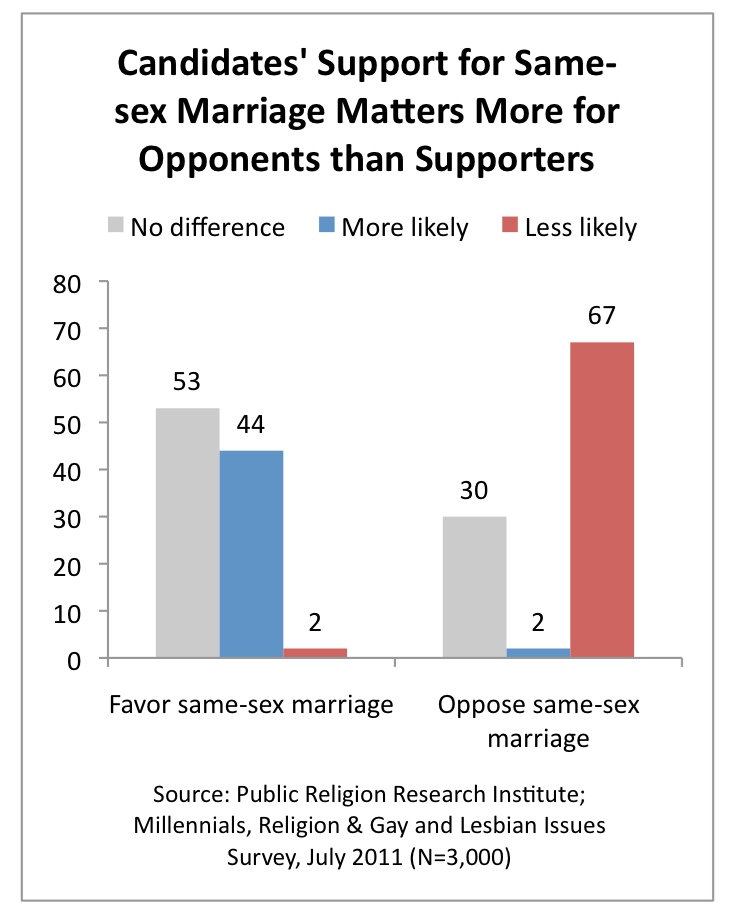 Among Millennials, however, candidates’ support for same-sex marriage has a significantly more positive impact than support for abortion. While a plurality (47%) of Millennials say a candidate’s support for same-sex marriage would make no difference in their support for the candidate, more Millennials than not say a candidate’s support for same-sex marriage would improve their odds of supporting the candidate (32% more likely vs. 21% less likely). In contrast, a plurality (46%) of Millennials say it would make no difference in their support, 33% report that it would make them less likely to support the candidate, and 1-in-5 (20%) report it would make them more likely to support the candidate.
Among Millennials, however, candidates’ support for same-sex marriage has a significantly more positive impact than support for abortion. While a plurality (47%) of Millennials say a candidate’s support for same-sex marriage would make no difference in their support for the candidate, more Millennials than not say a candidate’s support for same-sex marriage would improve their odds of supporting the candidate (32% more likely vs. 21% less likely). In contrast, a plurality (46%) of Millennials say it would make no difference in their support, 33% report that it would make them less likely to support the candidate, and 1-in-5 (20%) report it would make them more likely to support the candidate.
Among Democrats, 45% say a candidate’s support for same-sex marriage would make no difference, and more Democrats than not say it would improve their odds of supporting the candidate (32% more likely vs. 22% less likely). Among Republicans, only 38% say a candidate’s support for same-sex marriage would make no difference in their support for a candidate; a majority (51%) say it would make them less likely to support the candidate, and 1-in-10 say it would make them more likely to support the candidate. Independents closely resemble the general public. Nearly half (46%) say a candidate’s support for same-sex marriage would make no difference, 31% report that it would make them less likely to support the candidate, and 21% report that it would make them more likely to support the candidate.
The political liability for political candidates expressing public support for same-sex marriage has diminished by a factor of 4 over the last few years. In 2003, nearly half (49%) of Americans said they would be less likely to support a presidential candidate who supported “gay marriage,” 10% said it would make them more likely to support the candidate, and 39% said it would make no difference. (2) In other words, in 2003, candidates faced a potential net negative impact of 39 points on the issue of same-sex marriage, compared to a potential net negative impact of only 10 points today.
When Americans are asked specifically about whether President Obama expressing public support for same-sex marriage would influence support for him in 2012, a similar pattern exists, although significantly more Americans (51%) say it would not make a difference. Sixteen percent of the public say that if Obama expressed public support for same-sex marriage it would make them more likely to vote for him, while 31% say it would make them less likely to support him.
Among Democrats, a majority (56%) report that President Obama expressing support for same-sex marriage would make no difference to their 2012 vote, 27% say it would make them more likely to vote for him, and 17% say it would make them less likely to vote for him. The pattern among political Independents is nearly identical to the general population, with 52% saying it would make no difference, 15% saying it would make them more likely to vote for him, and 31% saying it would make them less likely to vote for him. Among Republicans, a majority (51%) say that a public expression of support for same-sex marriage would make them less likely to vote for him. Only 3% say it would make them more likely. Forty-five percent say it would not make a difference.
V. Gay and Lesbian Relationships in Society
Social Acceptance of Gay and Lesbian Relationships
Nearly two-thirds (64%) of Americans agree that gay and lesbian relationships should be accepted by society. Support for acceptance of gay and lesbian relationships is strong among most age groups, with Millennials expressing the strongest support at 77%. Seniors are divided, with 48% agreeing that gay and lesbian relationships should be accepted by society and 48% disagreeing.
Among religious groups, majorities of the unaffiliated (82%), non-Christian religiously affiliated Americans (81%), Catholics (72%), white mainline Protestants (69%), and black Protestants (59%) agree that gay and lesbian relationships should be accepted by society. White evangelical Protestant Christians are the only major religious group in which less than a majority (37%) say gay and lesbian relationships should be accepted by society.
Personal Comfort with Gay and Lesbian People Serving in Public Roles in Society
Americans report being very or somewhat comfortable with gay and lesbian people serving in a range of public service professions including as a law enforcement officer (75%), a doctor (71%), a judge (70%), a high school teacher (63%), an elementary school teacher (61%) or a clergy person (56%). Millennials, women, Democrats and college educated Americans report being more comfortable with gay and lesbian people across these six different positions than seniors, men, Republicans, and those with less than a college education.
Perceptions of Social Trends Regarding Gay and Lesbian People
Half of the public say that more companies providing health benefits to partners of gay and lesbian employees is a good thing for society.
Less than 1-in-5 (17%) say it is a bad thing, and roughly one-third (31%) say it does not make any difference. A majority of most religious groups say this is a good thing for society, including white mainline Protestants (51%), black Protestants (52%), Catholics (53%), the unaffiliated (65%), and non-Christian affiliated (69%).
More than one-third (34%) of Americans say that more gay and lesbian people “coming out” and letting people know they are gay or lesbian is a good thing for society, compared to 18% who say it is a bad thing for society. Nearly half (47%) the public say this trend does not make much difference.
One-in-four Americans say that more churches allowing openly gay and lesbian people to become clergy is a good thing for society. Nearly 4-in-10 (38%) say it is a bad thing for society. One-third of the public say this trend does not make a difference to society. There are significant differences between Americans by frequency of worship attendance. Nearly 6-in-10 (59%) Americans who attend religious services at least once a week say this is a bad thing for society, compared to only 20% of Americans who seldom or never attend.
On the issue of same-sex marriage, Americans are more likely to say that more gay and lesbian couples getting married is a bad thing (37%) than a good thing (22%) for society, although a plurality (40%) say it does not make a difference. Among supporters of same-sex marriage, 44% say it is a good thing for American society, and a majority (53%) say it does not make any difference to society. Among opponents of same-sex marriage, nearly three-quarters (74%) say it is a bad thing for society and 24% say it does not make any difference.
Social Acceptability of Supporting or Opposing Same-sex Marriage
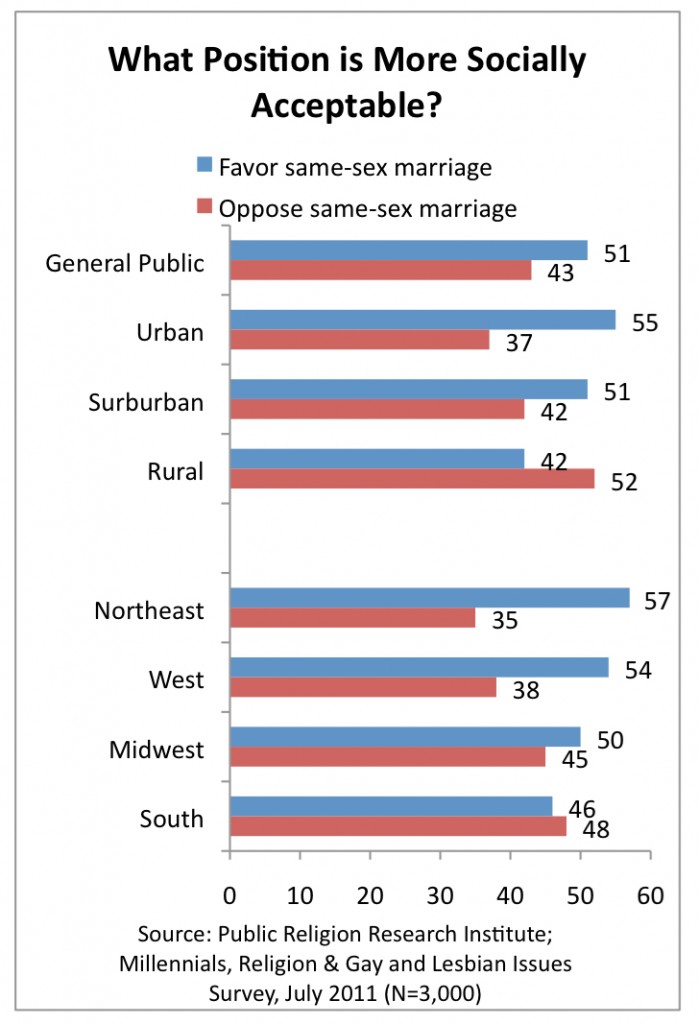 A majority of Americans think it is more socially acceptable to be in favor of same-sex marriage (51%) than to oppose it (43%). There are significant divisions by age, community type, and region.
A majority of Americans think it is more socially acceptable to be in favor of same-sex marriage (51%) than to oppose it (43%). There are significant divisions by age, community type, and region.
Nearly two-thirds (64%) of Millennials say that it is more socially acceptable to favor same-sex marriage than to oppose it. Among seniors, a majority (56%) say it is more socially acceptable to oppose same-sex marriage.
Majorities of Americans living in urban or suburban communities say it is more socially acceptable to support same-sex marriage (55% and 51%). A majority of Americans living in rural areas say it is more socially acceptable to oppose same-sex marriage (52%). A majority of Americans living in the Northeast and West say supporting same-sex marriage is the socially acceptable position (57% and 54% respectively), while those living in the Midwest and South are split (50% and 46%).
Americans who support same-sex marriage are more likely than those who oppose same-sex marriage to believe that their position is the more socially acceptable one. More than 7-in-10 (71%) Americans who support same-sex marriage say that their own position is more socially acceptable. On the other hand, 63% of those who oppose same-sex marriage say that their own position is the more socially acceptable one.
Difficulty of Living Openly as a Gay or Lesbian Person
A majority (51%) of the public say it is very or somewhat difficult in their community to live as an openly gay or lesbian person, compared to 45% who say it is not too difficult or not at all difficult.
Views vary somewhat by region and significantly by community type. Those in the Northeast are less likely to believe that it is very or somewhat difficult to live openly as a gay or lesbian person in their community (46%) than those in the West (50%), South (54%) and Midwest (54%). Americans living in rural communities (60%) are much more likely to say it is difficult to live openly as a gay or lesbian person in their community, compared to those living in suburban (52%) or urban (49%) communities.
Women (54%) are more likely than men (48%) to perceive that it is difficult to live openly as a gay or lesbian person in their community. Millennials (57%) are more likely to say living as an openly gay or lesbian person in their community is difficult than Americans overall (51%).
Interestingly, there is no significant difference between supporters and opponents of same-sex marriage in perceptions of difficulty of living openly as a gay or lesbian person.
VI. Morality and Sin
Moral and Theological Evaluations of Personal Behaviors Related to Sexuality
On a wide range of different personal behaviors, Americans are more likely to evaluate behaviors related to sexuality as morally wrong than morally acceptable. A majority (55%) of Americans say sex between an unmarried man and woman is morally acceptable, but they have moral reservations about a range of other personal behaviors related to sexuality. Two-thirds of Americans say that sex between a young man and young woman under the age of 18 is morally wrong. A majority of Americans say that having an abortion is morally wrong and that sex between two adults of the same gender is morally wrong (55% and 56% respectively). More than three-quarters (76%) say that sending sexually explicit messages by email or text is morally wrong.
Younger Americans are generally more likely to say certain personal behaviors are morally acceptable than older Americans, with the important exception of abortion. Half of Millennials say that sex between two adults of the same gender is morally acceptable, compared to only 26% of seniors. Nearly 7-in-10 (68%) Millennials say that sex between an unmarried man and woman is morally acceptable, compared to 38% of seniors. However, similar numbers of Millennials (33%) and seniors (28%) say that having an abortion is morally acceptable. Nearly 6-in-10 (59%) of both Millennials and seniors say having an abortion is morally wrong.
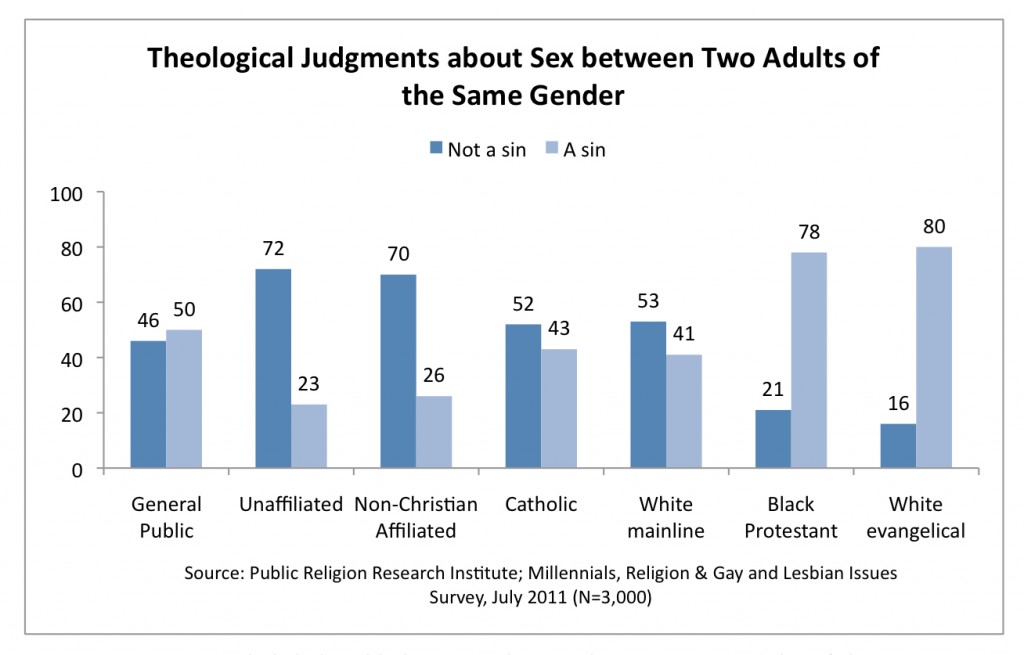 With the exception of white mainline Protestants, majorities of all major Christian groups say that sex between two adults of the same gender is not morally acceptable. White mainline Protestants are nearly evenly divided, with 48% saying it is morally wrong and 46% saying it is morally acceptable. On the other hand, more than 6-in-10 non-Christian religiously affiliated Americans (63%) and religiously unaffiliated Americans (63%) say sex between two adults of the same gender is morally acceptable.
With the exception of white mainline Protestants, majorities of all major Christian groups say that sex between two adults of the same gender is not morally acceptable. White mainline Protestants are nearly evenly divided, with 48% saying it is morally wrong and 46% saying it is morally acceptable. On the other hand, more than 6-in-10 non-Christian religiously affiliated Americans (63%) and religiously unaffiliated Americans (63%) say sex between two adults of the same gender is morally acceptable.
Americans are slightly less likely to say that sex between two adults of the same gender is a sin than they are to say it is morally wrong. Half of the general public say it is a sin; 46% disagree. There is considerable diversity of opinion among religious groups on the question of whether sex between two adults of the same gender constitutes a sin or not. Majorities of white mainline Protestants (53%), Catholics (52%), and non-Christian affiliated Americans (70%) say it is not a sin. On the other hand, strong majorities of white evangelical Protestants (80%) and black Protestants (78%) say it is a sin.
Among the half (50%) of Americans who believe that sex between two adults of the same gender is a sin, more than two-thirds (68%) say that their church should respond to gay and lesbian people in committed relationships by treating homosexuality as a sin, but welcoming gay and lesbian couples in church. Only 1-in-5 say their church should treat homosexuality as a sign and not welcome gay and lesbian couples (20%).
Traditionalism vs. Change and Contextual vs. Universal Approaches to Morality
The survey measured two different approaches to moral traditionalism and moral reasoning: a measure of openness to change vs. protecting traditional values, and a measure of contextual vs. universal orientation to moral reasoning.
On the first measure of openness to change vs. protecting traditional values, 60% of Americans say that “what makes America great is that it is open to change and new ways of doing things,” compared to 35% who say that “what makes America great is that it protects traditional values and ways of doing things.” At least 7-in-10 Millennials (70%), Democrats (71%) and African Americans (71%) say that what makes America great is its openness to change. Less than half of seniors (49%), Republicans (41%) and Americans who identify with the Tea Party movement (31%) agree. Americans who identify with the Tea Party are more likely than any other group to say that what makes America great is that it protects traditional values and ways of doing things (65%).
Views on this question are strongly associated to views on a range of gay and lesbian issues. Among Americans who say what makes America great is that it is open to change, 6-in-10 support allowing gay and lesbian couples to marry, compared to only 33% who oppose. Among Americans who say what makes America great is that it protects traditional values, 71% oppose allowing same-sex couples to marry.
Americans are more closely divided on a measure of contextual vs. universal approaches to moral reasoning. Half of all Americans agree that “there are some things that are just wrong regardless of the situation,” compared to nearly as many (47%) who say that “what is right or wrong depends on the situation.” There are significant generational, religious and political differences, with a majority of non-Christian religiously affiliated Americans (60%), young people (57%), Democrats (57%), and Catholics (51%) embracing a contextual approach to morality. A strong majority of Republicans (64%), white evangelicals (63%), and seniors (54%) embrace the more universal approach to moral reasoning, agreeing that there are some things that are just wrong.
These contextual vs. universal approaches to moral reasoning also have a strong relationship to attitudes about gay and lesbian issues and moral evaluations of personal behavior. Among Americans who agree that what is right or wrong depends on the situation, 58% support same-sex marriage and a majority (56%) say sex between two adults of the same gender is not a sin. In contrast, 59% of those who agree that some things are just wrong oppose same-sex marriage, and 60% say that sex between two adults of the same gender is a sin.
Moral and Theological Views of Gay and Lesbian People
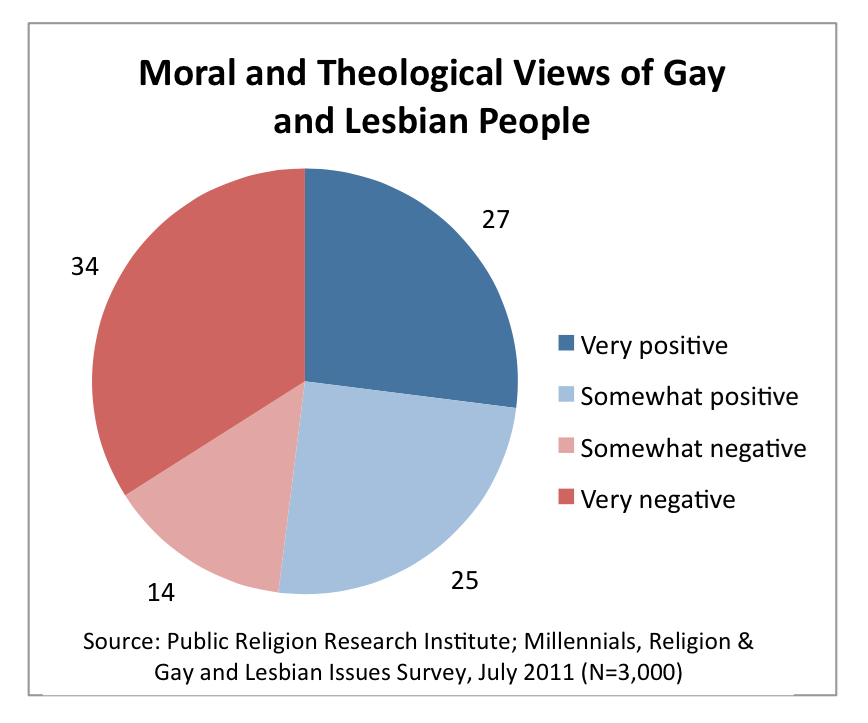 While Americans overall have reservations about the morality of same-gender sexual activity, these reservations do not directly translate into negative moral and religious evaluations of gay and lesbian people. Three-fourths (74%) of Americans agree that “Gay and lesbian people can be as committed to God and their religion as anyone.” Nearly two-thirds (64%) agree that “Gay and lesbian people generally live their lives guided by good moral values.” Reflecting the divisions over same-sex marriage, Americans are more divided over the question of whether “gay and lesbian relationships can be blessed by God” (45% agree, 47% disagree).
While Americans overall have reservations about the morality of same-gender sexual activity, these reservations do not directly translate into negative moral and religious evaluations of gay and lesbian people. Three-fourths (74%) of Americans agree that “Gay and lesbian people can be as committed to God and their religion as anyone.” Nearly two-thirds (64%) agree that “Gay and lesbian people generally live their lives guided by good moral values.” Reflecting the divisions over same-sex marriage, Americans are more divided over the question of whether “gay and lesbian relationships can be blessed by God” (45% agree, 47% disagree).
We combined these three measures to create a single additive scale in order to provide a more comprehensive portrait of Americans’ moral and theological acceptance of gay and lesbian people. This composite measure provides a clearer picture of how Americans morally and theologically view gay and lesbian people and same-sex relationships. A majority of the public has a very positive (27%) or somewhat positive (25%) moral and theological view of gay and lesbian people, and less than half have a somewhat negative (14%) or very negative (34%) view.
There are dramatic differences by religious affiliation. Majorities of every major religious group, with the exception of black Protestants and white evangelical Protestants, have either somewhat or very positive moral and theological views of gay and lesbian people. More than 6-in-10 Catholics and white mainline Protestants have a somewhat or very positive moral and theological view of gay and lesbian people (62% and 63% respectively). Roughly 7-in-10 non-Christian religiously affiliated Americans and Americans with no formal religious affiliation have a positive moral and theological view of gay and lesbian people (69% and 71% respectively). More than 6-in-10 (61%) black Protestants and three-quarters of white evangelicals have a somewhat or very negative moral and theological view. Among white evangelicals, fully 61% have a very negative theological and moral view.
A majority of every age group except seniors have a somewhat or very positive moral and theological view of gay and lesbian people. Among Millennials nearly two-thirds (64%) have a positive view compared to less than 4-in-10 (39%) seniors. More than 6-in-10 (61%) seniors have a negative moral and theological view of gay and lesbian people including 45% who have a very negative view.
The Morality-Legality Gap
Although less than 4-in-10 (39%) Americans say that sex between two adults of the same gender is morally acceptable, nearly half (47%) favor allowing gay and lesbian people to marry and nearly two-thirds (64%) say that gay and lesbian relationships should be accepted by society. In fact a significant number of Americans who morally disapprove of same-gender sexual relationships still support rights for gay and lesbian people. Nearly 1-in-5 (18%) Americans who say sex between adults of the same gender is morally wrong still favor allowing gay and lesbian couples to marry, and 4-in-10 say gay and lesbian relationships should be accepted by society.
VII. Gay and Lesbian People and the Church
Ordination of Gay and Lesbian People
Americans are nearly evenly divided on the question of whether gay and lesbian people should be eligible for ordination with no special requirements, with 48% agreeing and 49% disagreeing. More than 6-in-10 (61%) Millennials agree, compared to only about one-third (34%) of seniors.
There are large differences between religious groups on this question. Majorities of non-Christian religiously affiliated Americans (70%) and white mainline Protestants (57%) support the ordination of gay and lesbian clergy, as do half (50%) of Catholics. On the other hand, majorities of African American Protestants (55%) and white evangelical Protestants (75%) oppose the ordination of gay and lesbian clergy.
Impact of Churches Allowing Blessings of Gay and Lesbian Couples
Among Americans who claim a religious affiliation and attend religious services at least a few times a year, nearly 6-in-10 (59%) say they would continue to attend their place of worship if it decided to allow blessings of gay and lesbian couples. Nearly two-thirds (65%) of religiously affiliated Millennials who attend worship services at least a few times a year say they would continue their attendance. Strong majorities of Catholics (73%), non-Christian religious Americans (71%), white mainline Protestants (70%), and black Protestants (62%) who attend religious services at least a few times a year agree they would continue attending their current place of worship if it decided to bless gay and lesbian couples. White evangelical Protestants (39%) who attend at least a few times a year are the only major religious group in which less than a majority say they would continue to attend their place of worship if it decided to allow the blessing of same-sex couples. A majority (57%) of white evangelicals say they would look for another place to attend if their church allowed blessings of gay and lesbian couples.
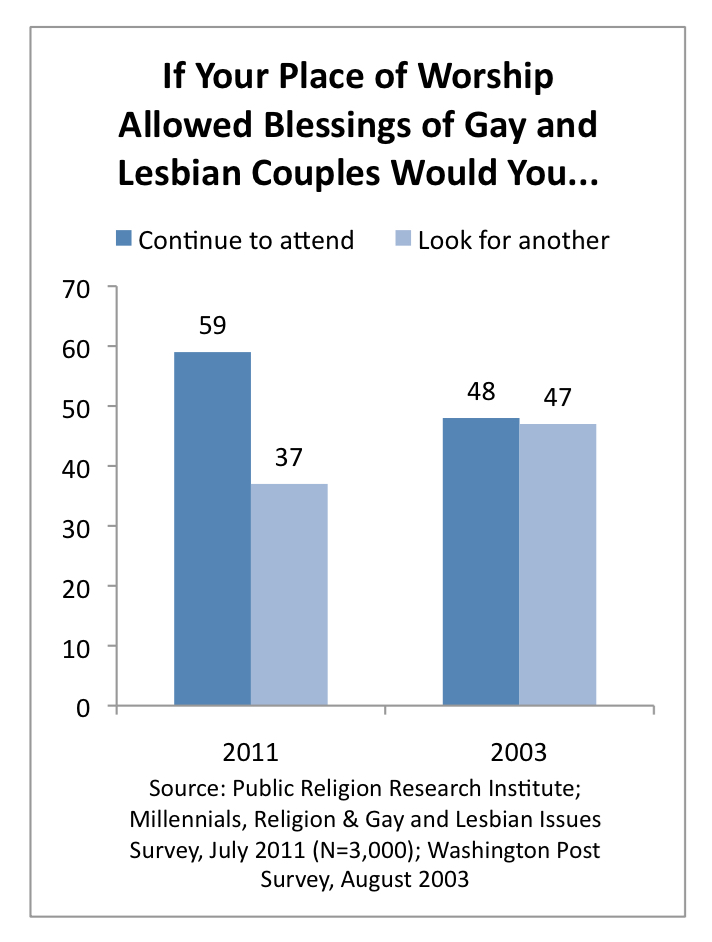 Americans are more comfortable today with the idea of their place of worship blessing gay and lesbian couples than they were in the past. In 2003, Americans were evenly divided over whether blessings of gay or lesbian couples would constitute a reason to look for another place to attend. Forty-eight percent of religiously affiliated Americans who attend religious services at least a few times a year said they would continue to attend and 47% said they would look for a new place to attend. (4)
Americans are more comfortable today with the idea of their place of worship blessing gay and lesbian couples than they were in the past. In 2003, Americans were evenly divided over whether blessings of gay or lesbian couples would constitute a reason to look for another place to attend. Forty-eight percent of religiously affiliated Americans who attend religious services at least a few times a year said they would continue to attend and 47% said they would look for a new place to attend. (4)
Gay and Lesbian People in Congregations
Among Americans who attend religious services at least once or twice a month (half of Americans), about one-third (32%) say that there are gay and lesbian people who regularly attend their church, compared to 42% who report that there are no gay or lesbian persons who regularly attend their congregation. Approximately one-fourth (26%) say they do not know.
Millennials are as likely as the general public to say gay or lesbian people regularly attend their congregations, but Millennials are less likely to say they do not know (17% compared to 33%) and more likely than older Americans to say there are none (50% compared to 42%). Four-in-ten Catholics (41%) and white mainline Protestants (40%), and almost as many black Protestants (36%) say there are gay and lesbian people who regularly attend their congregations. White evangelical Protestants (21%) are least likely to say there are gays or lesbian persons attending their congregations; nearly 6-in-10 (58%) say there are none.
Among those who attend services at least once or twice a month and who believe there are gay or lesbian persons who regularly attend their congregations (17% of Americans), 28% say gay and lesbian couples are listed together in the congregational directory, and about as many (31%) say they are listed separately.
Impact of Negative Messages about Homosexuality Coming from America’s Places of Worship on Gay and Lesbian Youth
Americans are six times more likely to say that messages about homosexuality coming from America’s places of worship are about discouraging homosexuality (37%) than to say the messages are about accepting homosexuality (6%). A slim majority (51%) of Americans report that most places of worship do not talk about the issue. There are only minor variations among age and religious groups on this question.
More than 6-in-10 Americans believe the messages about homosexuality coming from America’s places of worship contribute either a lot (23%) or a little (40%) to higher rates of suicide among gay and lesbian youth. Just over one-fourth (27%) say these messages do not contribute at all to higher rates of youth suicide.
Millennials are more likely than other Americans to say these messages contribute to higher suicide rates among gay and lesbian youth; nearly 8-in-10 say they contribute a lot (32%) or a little (48%). Nearly 8-in-10 Hispanics also say the messages from churches about homosexuality contribute a lot (38%) or a little (40%) to higher rates of suicide among gay and lesbian youth—a rate significantly higher than any other racial or ethnic group.
Majorities of every major religious group believe messages from churches contribute to higher rates of suicide among gay and lesbian youth: 73% of non-Christian religiously affiliated Americans, 64% of Catholics, 60% of black Protestants, 59% of white mainline Protestants, and 51% of white evangelical Protestants.
What People are Hearing During Religious Services
Americans who attend religious services at least once or twice per month say the clergy in their place of worship speak about poverty (87%), sexual immorality (70%), abortion (64%), the environment (59%), and welcoming gay and lesbian people in the congregation (29%).
A majority of all religious groups say that they do not hear about welcoming gay and lesbian people in church, although there are some surprising differences between religious groups. For example, black Protestants are more likely to say their clergy talk about welcoming gay and lesbian people (48%) than any other group, despite being strongly opposed to same-sex marriage and strongly believing sex between two adults of the same gender is a sin. And despite generally being the two most supportive religious groups of same-sex marriage, white mainline Protestants (25%) and Catholics (19%) are among the least likely to report hearing their clergy discuss welcoming gay and lesbian people in church.
Religious Groups’ Actions: Alienating the Young vs. Holding their Ground
A majority (54%) of Americans say religious groups are alienating young people by being too judgmental about gay and lesbian issues. There are dramatic differences in perceptions by age.
Nearly 7-in-10 (69%) Millennials agree that religious groups are alienating young people by being too judgmental about gay and lesbian issues. A majority (56%) of American age 30 to 49 also agree. Among Americans age 50 to 64, half agree while nearly as many (44%) disagree. Among seniors, only 37% agree that religious groups are alienating young people by being too judgmental, and 48% disagree. Fifteen percent of seniors say they don’t know.
With the exception of white evangelical Protestants, majorities or pluralities of every major religious group agree that religious groups are alienating young people by being too judgmental about gay and lesbian issues. About three-fourths of the unaffiliated (75%) and non-Christian religiously affiliated Americans (73%), majorities of Catholics (55%) and African American Protestants (52%), and half of white mainline Protestants (50%) agree. Only 36% of white evangelical Protestants agree, compared to nearly 6-in-10 (59%) who disagree.
Most Americans (53%) disagree that “religious groups should hold their ground and oppose efforts to make homosexuality acceptable,” including 30% who strongly disagree. There are only modest differences on this question by age. There are also similar patterns among religious groups on this question, but Catholics stand out: Catholics are significantly more likely than other religious groups to disagree (57%) that opposing efforts to make homosexuality acceptable is the right strategy for the church.
Evaluations of the Catholic Church Position on Homosexuality
Among Catholics, 46% think their Church’s position on the issue of homosexuality is too conservative, 43% think it is about right, and only 6% think it is too liberal. Among Catholics who attend church at least weekly, nearly 4-in-10 (37%) say that the Catholic Church is too conservative on the issue of homosexuality, a majority (54%) say the position of Catholic Church is about right, and only 4% say it is too liberal.
There are significant ethnic divisions among Catholics in their views about the Church’s position on homosexuality. A majority (55%) of Hispanic Catholics say the Catholic Church is too conservative on the issue of homosexuality, compared to 43% of white non-Hispanic Catholics.
Endnotes
1 The analysis of young Republicans and young white evangelicals is based on less than 100 cases (N=85 and N=67 respectively). Some caution should be exercised in interpreting these results because of small sample sizes.
2 Associated Press Survey, August 2003.
3 Reliability analysis conducted on these measures determined that they could be combined into a single scale (Cronbach’s Alpha=0.83).
4 Washington Post Survey, August 2003.
Recommended citation:
Jones, Robert P., Daniel Cox, and Elizabeth Cook. “Generations at Odds: The Millennial Generation and the Future of Gay and Lesbian Rights.” PRRI. 2011. http://www.prri.org/research/generations-at-odds/.
